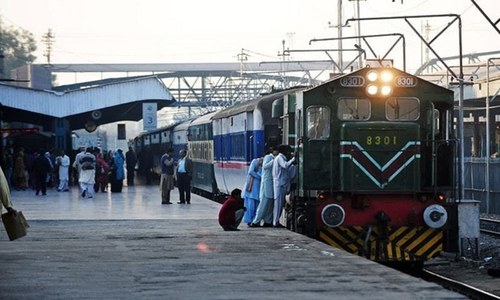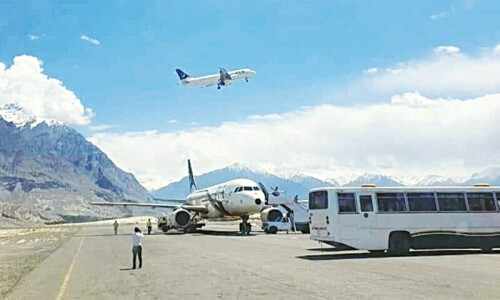EVEN in critical areas where human life is at stake, the government remains inexplicably indecisive and appears to be waiting for yet another tragedy to spur it into action. You don’t have to look far for evidence.
Whether it is international politics or merely the fact that the government is so bogged down in the battle for its own survival that lives of the public take a back seat is immaterial. What matters is that crucial decisions are not being made.
Just go through this newspaper’s Saturday (yesterday) epaper edition; there is a double column news item on page 3 by reporter Khalid Hasnain headlined: ‘Delay in ML-1 approval hinders efforts to reduce train accidents’.
The report says the federal government continues to delay approval of Rs30 billion urgently needed for the rehabilitation of the decrepit rail track from Khanpur in Punjab to Kotri in Sindh. The request was made three months back in the aftermath of the June 7 accident in Ghotki district which resulted in some three dozen fatalities and over 100 injuries.
One hopes that someone in the upper echelons of power can address the issue of the dangers to the travelling public using trains.
(Since this government came into office alone, at least 170 people have been killed and hundreds of others injured and maimed in eight train accidents, all of them avoidable, as the disasters were blamed by experts on the abysmal state of the infrastructure.)
Read: The decline of Pakistan Railways
The Dawn reporter says that Pakistan Railways has no option but to continue operations on the existing line as approval for the Main Line-1 (ML-1) project under the China-Pakistan Economic Corridor is proving to be elusive.
The report quotes an official as saying: “The situation is very disappointing as the Rs 30bn PC-1 meant for the rehabilitation of the 470 kilometres critical Line-1 track from Khanpur to Kotri — a stretch that has seen the majority of fatal and non-fatal accidents, especially in the last three years — is yet to be approved by the Planning Commission… .”
The official who requested anonymity warned “the delay may lead to major accidents on this portion anytime in the future as the track is in a dilapidated condition and is considered high-risk” along the entire stretch.
The report said senior officials are of the view that the CPEC ML-1 project is supposed to rehabilitate the entire track from Karachi to Peshawar which is pending approval of the Chinese government, so the execution of this RS30bn scheme could be questioned in the future on the grounds of whether it was at all necessary.
What was not mentioned is the underlying reticence in a lot of the decision-making where the bureaucracy and other institutions are paralysed, fearing a draconian witch-hunt in the future, given the manner of the accountability process prosecuted by NAB.
That is why the official, Khalid Hasnain reports, made an impassioned plea to the federal government to intervene with the Planning Commission to push through this approval since the project approval is facing delays and a decision is time-critical for public safety.
Under this, Pakistan Railways plans to rehabilitate 15 to 25kms critical stretches of the Khanpur-Kotri track by replacing with new the existing tracks as also seeing to the refurbishment and maintenance of the less decrepit portions of the line, according to the report.
All one can earnestly hope for is that someone in the upper echelons of power can put on hold concerns for their own survival and address the issue of the dangers to the travelling public using trains in the country.
As it is, the railways have suffered from decades of neglect, dating back to Gen Ziaul Haq’s regime when, despite endless American funding for fighting the West’s war against the Soviet Union in Afghanistan, the military ruler ordered one of his senior junta members to set up a road haulage operation rather than upgrade the railways.
The investment in the railway infrastructure, rolling stock and passenger carriages would have made so much sense for reasons ranging from concerns for the environment to fixed line energy efficient transportation of goods and people. Instead, the NLC was born.
There was always a killing to be made in setting up any operation from the ground up and an asset inherited from the colonial masters, one of the few good things that the evil of colonialism left us, was allowed to rot, and fall into disuse and disrepair.
Although I am far from being an expert, it seems safe to say something is amiss in the much-trumpeted CPEC progress as it would be insane for either country/ players involved to not actively pursue a project of this significance and one whose fruits would potentially be shared by so many.
But then, to be honest, I don’t understand the intricacies of global politics and I am unsure how far Pakistan is prepared to go in its bridge-building with the US, Biden phone call or not. And how long a shadow will it cast on Pakistan-China ties.
For example, the US-hosted democracy summit appears to be targeting China with Washington having invited Taipei and not Beijing. The invitations to Pakistan, India and Nepal that share a border with China from South Asia and not to Bangladesh and Sri Lanka that don’t, must also indicate deeper politics behind the democracy summit.
Read: Pakistan may attend US democracy summit
To accept or not to accept the invitation must be a major dilemma facing Pakistan especially since, as one news report said, Islamabad would not want to leave the field open for New Delhi. But accepting the invitation when Taiwan will be there and not the PRC may send the wrong signal to Beijing.
This may sound like a digression. It is not. The whole idea was to demonstrate that international politics, particularly one that marks relations between global giants US and China, will continue well into the future.
But this should not mean Pakistan has to put on hold decisions vital to the well-being of its own citizens. Travelling in safety on trains is just one small part of that but will establish the ability of the government to prioritise.
The writer is a former editor of Dawn.
Published in Dawn, November 28th, 2021















































